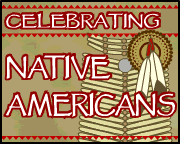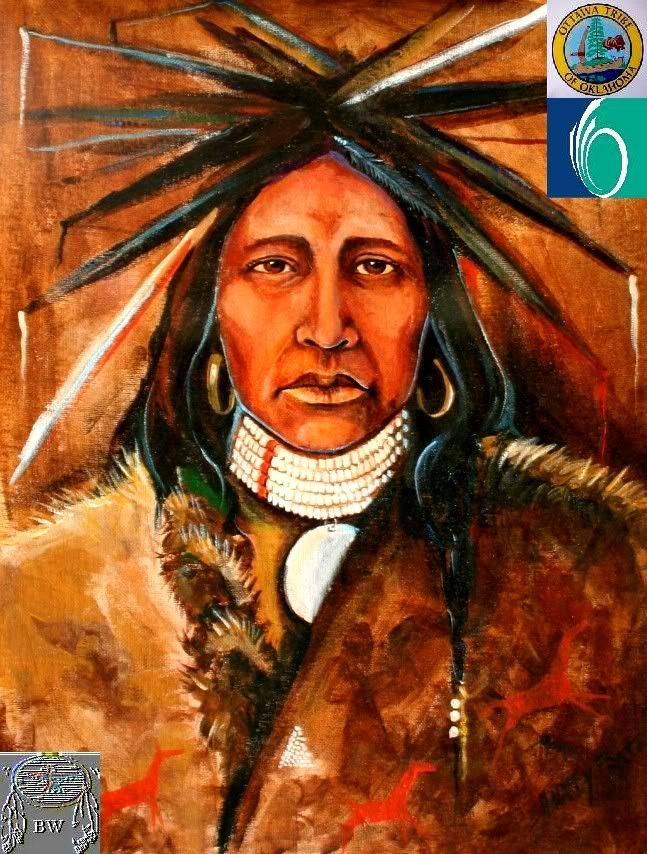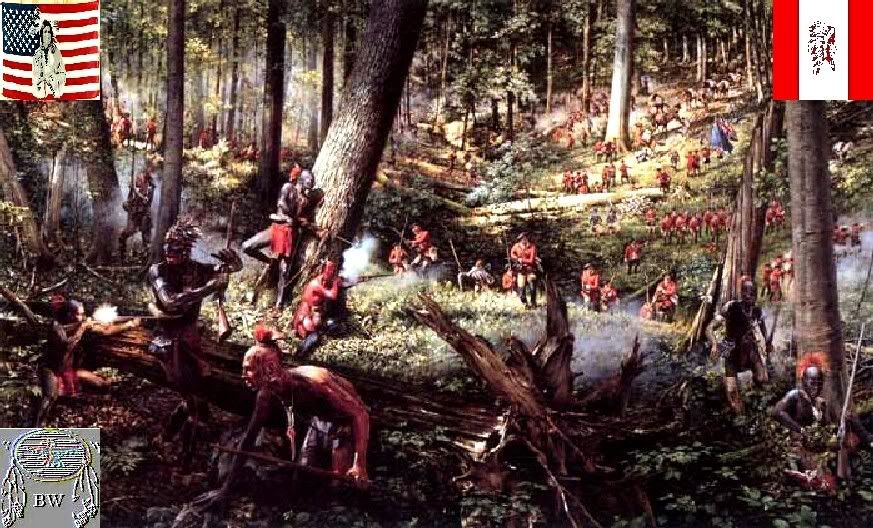|
BRAVEHORSE WARRIOR Saguima
Ottawa Warrior

 Chief Saguima
Warrior Citation
SAGUIMA (Saguina, Sakima, Saquima and possibly Saquin), Ottawa chief; fl. 1707?–44? Since the name is an Ottawa word
for medicine man, it is impossible to be certain that all references in documents are to the same individual. Saguima, an
Ottawa chief from Michilimackinac regarded by the French as a loyal ally, attended councils at Montreal and Quebec in 1707.
He and Koutaoiliboe reported to Governor Philippe de Rigaud de Vaudreuil on events at Detroit and Michilimackinac, claiming
much of the credit for the surrender of Le Pesant, an Ottawa chief involved in the killing of two Frenchmen. At the same time
Saguima apologized to Vaudreuil for not fulfilling a promise to bring slaves for the French to give the Iroquois. By 1712
Saguima had moved to Detroit, and he became a key figure in the early stages of the Fox war, which troubled the west until
1737. Apparently provoked by the taunts of a group of Mascoutens who were hunting close to his village, Saguima planned their
destruction. In April 1712 he and a Potawatomi chief named Makisabi headed a party of a hundred warriors who attacked the
Mascoutens near the St Joseph River and after a three-day battle slaughtered 200 of the survivors. The remainder of the Mascouten
band fled to Detroit.
Chief Saguima
Warrior Citation
SAGUIMA (Saguina, Sakima, Saquima and possibly Saquin), Ottawa chief; fl. 1707?–44? Since the name is an Ottawa word
for medicine man, it is impossible to be certain that all references in documents are to the same individual. Saguima, an
Ottawa chief from Michilimackinac regarded by the French as a loyal ally, attended councils at Montreal and Quebec in 1707.
He and Koutaoiliboe reported to Governor Philippe de Rigaud de Vaudreuil on events at Detroit and Michilimackinac, claiming
much of the credit for the surrender of Le Pesant, an Ottawa chief involved in the killing of two Frenchmen. At the same time
Saguima apologized to Vaudreuil for not fulfilling a promise to bring slaves for the French to give the Iroquois. By 1712
Saguima had moved to Detroit, and he became a key figure in the early stages of the Fox war, which troubled the west until
1737. Apparently provoked by the taunts of a group of Mascoutens who were hunting close to his village, Saguima planned their
destruction. In April 1712 he and a Potawatomi chief named Makisabi headed a party of a hundred warriors who attacked the
Mascoutens near the St Joseph River and after a three-day battle slaughtered 200 of the survivors. The remainder of the Mascouten
band fled to Detroit.
 As soon as the Foxes living at Detroit learned of the massacre of their Mascouten allies, they prepared to attack the
French, whom they regarded as indirectly responsible. Then Saguima, Makisabi, and 600 warriors – Ottawas, Potawatomis,
Illinois, Osages, Sauks, and Menominees – arrived at Detroit in pursuit of the fleeing Mascoutens. A deep-seated resentment
towards the Foxes and Mascoutens by the other tribes probably explains why Saguima was able to mobilize so large a force so
quickly and why he was joined shortly by Mississaugas, Ojibwas, and Hurons. The Detroit garrison under Jacques-Charles Renaud
Dubuisson allied itself with Saguima’s coalition and attacked the fortified Fox village, blockading it for 19 days.
Before the attack Saguima’s wife and two other women from his village had been taken prisoner by the Foxes, and by a
ruse the allies secured their release. Many Foxes and Mascoutens died from hunger, thirst, and disease, and terms of surrender
were offered several times by the Fox chief Pemoussa but were rejected by the allies. Finally under cover of darkness the
besieged Native Americans escaped from their fort, but they were pursued, surrounded, and slaughtered. Dubuisson estimated
their losses at a thousand men, women, and children. After the battle Saguima abandoned his village and returned to Michilimackinac.
Joseph-Jacques Marest, the Jesuit missionary there, welcomed Saguima’s presence, believing that the Foxes and Mascoutens
feared him and would be deterred from attacking the settlement. In Marest’s opinion Saguima had more influence over
the Ottawas than anyone else, but his power, like that of most Algonkian chiefs, was not great. When, for example, he requested
in the summer of 1712 that the French send him one or two red blankets and a justaucorps, he specified that the gifts should
not be delivered by any of his own people. They would steal them. In 1744 there are documentary references to a “Saquin,”
who was much respected by the Indians, but it seems unlikely that this was the same person. From: historical accounts & records
As soon as the Foxes living at Detroit learned of the massacre of their Mascouten allies, they prepared to attack the
French, whom they regarded as indirectly responsible. Then Saguima, Makisabi, and 600 warriors – Ottawas, Potawatomis,
Illinois, Osages, Sauks, and Menominees – arrived at Detroit in pursuit of the fleeing Mascoutens. A deep-seated resentment
towards the Foxes and Mascoutens by the other tribes probably explains why Saguima was able to mobilize so large a force so
quickly and why he was joined shortly by Mississaugas, Ojibwas, and Hurons. The Detroit garrison under Jacques-Charles Renaud
Dubuisson allied itself with Saguima’s coalition and attacked the fortified Fox village, blockading it for 19 days.
Before the attack Saguima’s wife and two other women from his village had been taken prisoner by the Foxes, and by a
ruse the allies secured their release. Many Foxes and Mascoutens died from hunger, thirst, and disease, and terms of surrender
were offered several times by the Fox chief Pemoussa but were rejected by the allies. Finally under cover of darkness the
besieged Native Americans escaped from their fort, but they were pursued, surrounded, and slaughtered. Dubuisson estimated
their losses at a thousand men, women, and children. After the battle Saguima abandoned his village and returned to Michilimackinac.
Joseph-Jacques Marest, the Jesuit missionary there, welcomed Saguima’s presence, believing that the Foxes and Mascoutens
feared him and would be deterred from attacking the settlement. In Marest’s opinion Saguima had more influence over
the Ottawas than anyone else, but his power, like that of most Algonkian chiefs, was not great. When, for example, he requested
in the summer of 1712 that the French send him one or two red blankets and a justaucorps, he specified that the gifts should
not be delivered by any of his own people. They would steal them. In 1744 there are documentary references to a “Saquin,”
who was much respected by the Indians, but it seems unlikely that this was the same person. From: historical accounts & records
|

